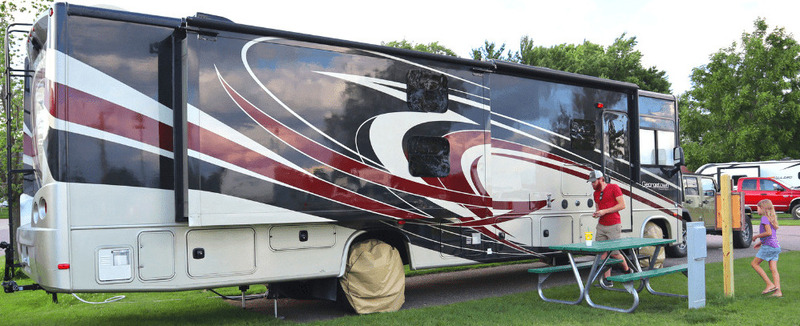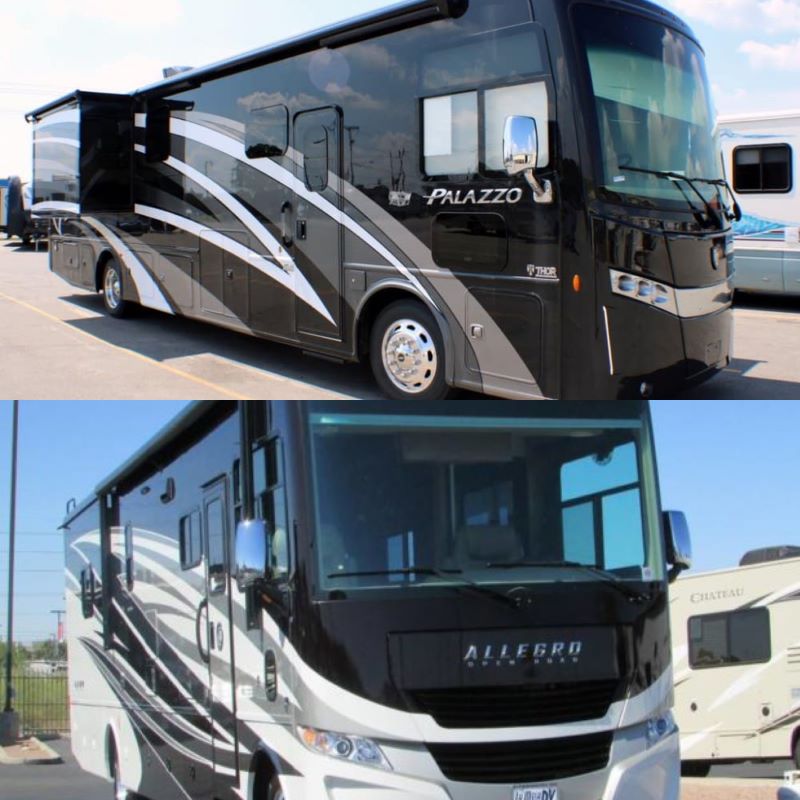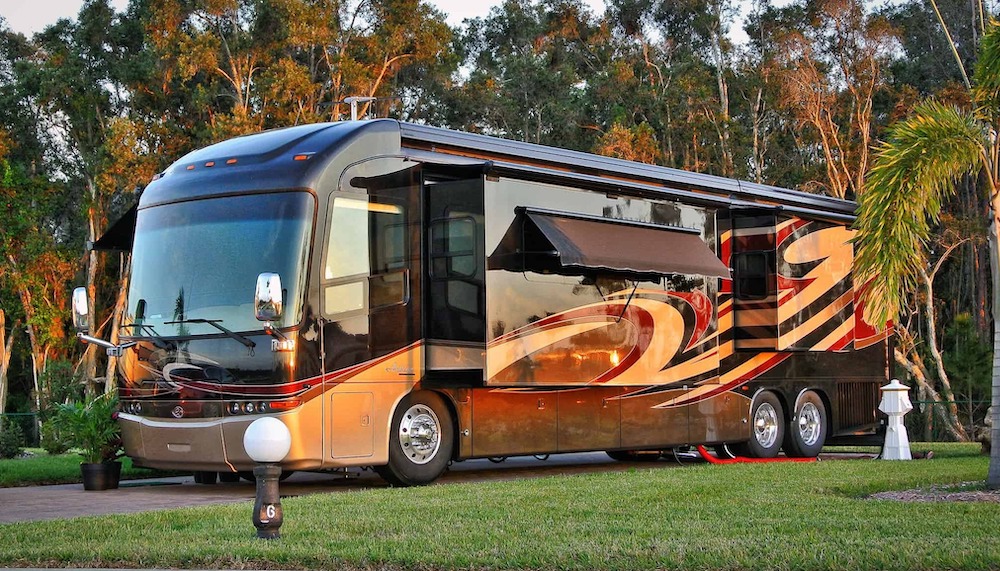Thanks for your support! If you make a purchase using our links in this article, we may make a commission. And, as an Amazon Associate, I earn from qualifying purchases. See the full disclosure here.
One of the most common questions we are asked when it comes to motorhomes is: Gas vs Diesel RV – Which are Best? This question has been debated since the 1970s and continues to this day.
In our quest to explore both sides of this coin, we’ve come up with one solution: it boils down to personal choice. Gassers (the slang for Gas RVs) have their benefits and almost everyone has had that dream of owning that ultimate multi-million dollar diesel Class A, B, or C motorhome.
To help you decide, we’ll show you some key topics and examples that represent the pros and cons of the diesel vs. gas motorhome debate.
By the end of this article, you’ll discover there’s one out there for almost every type of RV lifestyle.
Since floor plans, features, and amenities are equal in gas and diesel RVs we should focus on the four main issues to consider when deciding between Gas vs. Diesel RVs, which are:
- Engine Lifespan or Longevity
- Fuel Efficiency and Capacity
- Maintenance and Servicing
- Insurance Costs
We also include examples (with videos) of gas and diesel RV motorhomes for you to see some of the differences between them. We broke them down into 4 categories, which are:
1️⃣ Small Gas Class A Motorhomes (27-33 Feet)
2️⃣ Full-Size Gas Class A Motorhomes (35-40 Feet)
3️⃣ Full-Size Front End Diesel Class A Motorhome (35-40 Feet)
4️⃣ Luxury Diesel Pusher Class A Motorhome (40-45 Feet)
What Kinds of RVs Have Gas or Diesel Engines?
Although we discuss Class A Motorhomes in this article and use them for our examples, all classes of drivable RVs, (hence the term motorhomes) are available with gas or diesel engines. So Class A, Class B (sometimes called Camper Vans), Class C, and even truck campers are all either gas or diesel-powered.
Gas vs Diesel RV Engine Lifespan Comparison

Gassers do have a shorter lifespan. A gas RV engine lasts either 20 years or 200,000 miles. With proper maintenance, the engine will last longer, but it may require replacing essential components.
Diesel RV engines can flip 500,000 miles and keep on rolling. The diesel Class A motorhomes use the same engines that commercial and industrial machinery use. The individual components of these powerplants can handle the incredible stress heavy equipment goes through every day.
When comparing the engine lifespan of gas vs. diesel motorhomes, diesel wins every time.
Gas vs Diesel: Fuel Efficiency and Capacity
Which type of RV gets better fuel efficiency? And can gas or diesel RVs hold more fuel?
The average fuel economy for Class A motorhomes is 7-13 miles-per-gallon (mpg) for diesel and 6-10 mpg for gassers.
Compared to passenger vehicles, this is low. But, when compared to other heavy-duty vehicles, the fuel efficiency is great! Especially when you consider the weight and stresses a motorcoach goes through.
When comparing fuel capacity in gas vs. diesel motorhomes, diesel has a larger holding capacity.
Gas Class A RVs have a fuel tank of 80 gallons. Diesel Class A motorhomes have fuel capacities that range from 100-200 gallons. The size of the tank usually comes from the auto manufacturer.
When the RV manufacturers receive the chassis, the essential automotive components, including the fuel system, are already in place. The RV engineers work with the auto engineers and work around their specifications, so they don’t have to alter anything that’s already in place.
Gas vs Diesel: Maintenance and RV Servicing
The maintenance issues between gas and diesel RVs are going to have trade-offs.
For example, Diesel engines now require Diesel Exhaust Fluid to convert hazardous chemicals to harmless nitrogen and water.
To protect your gas RV engine, you need to add a fuel stabilizer to your gas tank.
These products have minimal costs but are vital to protect your RV.
Generally, automotive servicing will be more expensive for diesel motorhomes than gas RVs. For example, a complete oil change service for a diesel RV will cost around $400-$450.
But for a gas RV, a complete oil change will only run you about $150-$200.
When it comes to repairs, it helps to know that diesel engines break down less often. Their chassis and frames can stand up to the road’s stresses and RV life a lot longer.
However, when a diesel does break down or need service, it’ll cost double or triple the price that you would for a gas RV. Since breakdowns and repairs happen less often on diesel RVs, the cost evens out.
Like any RV, if you keep up with preventative maintenance, most problems are avoidable.
Gas vs. Diesel Motorhome Insurance Rates

If you don’t see the pattern already, insurance rates are going to follow it. Diesel motorhomes are more expensive to insure than gas RVs.
If you’re new to how insurance rates for RVs work, they’re different than your car or home policies.
An RV insurance policy lasts for 12 months and covers your RV as a vehicle and as a home. It works like a car insurance policy and a home insurance policy, all at the same time. RV insurance coverage includes several things:
- Comprehensive and Collision
- Liability
- Personal Injury (you and a third party)
- Property Damage
- Vacation Loss (your vacation is ruined due to an accident)
- Car rental (not RV rental)
RV insurance rates are pretty incredible when compared to other types of insurance. And, RV insurance actually has the best rates of any other type of coverage.
On new Class A motorhomes, you can expect to pay in the thousands – but remember this is for a whole year. To give you some perspective, Michigan had the highest average rate in 2020 (almost $4,500) and Oregon had the lowest ($1,108) using all categories or RVs.
Used Class A motorhomes have better rates than new models, and if you’re a part-time RVer you’ll save even more money. Full-time RV insurance costs more, but it’s still affordable.
Other factors that affect your RV insurance rate include gas vs. diesel RV, your driving record, and where you live or where your domicile is. If you bundle your home and/or auto and RV insurance, you may be eligible for discounts.
However, when it comes to the rates between gas vs. diesel RVs, here’s the bottom line. Diesel RVs cost more to insure than gas RVs.
Popular RV Insurance Companies with Good Rates:
Demystifying Engine Choices: Debunking Gas vs. Diesel RV Myths
Most of the myths in the gas vs. diesel RV debate revolve around emissions and clean driving. Most of these are centered around diesel RVs in both good and bad ways.
- Diesel engines are dirty
- Diesel engines produce more CO² per gallon
- Diesel engines produce fewer emissions than gasoline counterparts
- Gas engine RVs are faster than diesel RVs
- Diesel engines are loud
These are just some of the prevailing myths that surround diesel and gas RVs and, for the most part, they are either wrong, grossly mischaracterized, or overexaggerated.
The idea that diesel engines are dirtier than gasoline engines is simply not backed up by anything. Gasoline-powered vehicles, from the mightiest Class A powerhouse to the four-cylinder coup, produce more emissions than diesel.
Diesel engines are heavily mischaracterized in the CO² department as well. The amount of carbon dioxide that both engine types create is always measured in terms of ‘per gallon.’ However, these Class A motorhomes should be classified on a ‘per mile’ basis since the rate of consumption is based on that. When you embrace that measurement, diesel engines produce 40% lower CO² rates than gassers.
The fact that gasoline RVs are faster than diesel RVs is undebatable. However, the difference with modern technology is so little that it’s almost a negligible point. Last but not least, those same advancements in technology have also reduced the decibel levels of a diesel engine.
If you sat two Class A Motorhomes side by side, one a gasser and the other a diesel pusher, and cranked them both up, you probably couldn’t tell which one was louder or hear one over the other. The gas vs. diesel RV debate is often misrepresented by the facts in the field and requires wading through the noise to find the right one for you.
Pros and Cons: Gas vs. Diesel RVs

Though the prevailing wisdom is that diesel RVs are better than gas RVs, especially when you get into the larger, Class A category, there are pros and cons to both.
Gasoline Motorhomes
| Pros | Cons |
|---|---|
| First and foremost, gasoline motorhomes are more affordable than diesel alternatives | Gas engines consume more fuel which means more pit stops |
| There’s less ‘specialization’ with parts and accessories | Gas engines have lower torque, which can be problematic in certain situations |
| Service places for gassers are more prevalent and easier to locate | Towing can be problematic if you are traveling through mountainous areas |
| Gas is more affordable and easier to get your hands on | |
| Gas engines perform better at high altitudes and are more resistant to cold |
Diesel Motorhomes
| Pros | Cons |
|---|---|
| Diesel engines provide more torque for a better towing and climbing experience | Newer diesel RVs have to deal with DEF (Diesel Exhaust Fluid), an additional expense on top of fuel |
| Diesel provides more mileage per gallon, making stops fewer and farther between | Diesel motorhomes are more expensive than their gasoline counterparts |
| Diesel engines have an extensive lifespan, well beyond what gas engines are capable of | Parts for diesel motorhomes are more specialized, harder to obtain, and costlier to purchase |
| That same engine longevity equates to higher resale values | |
| Diesel engines require less frequency in terms of maintenance |
1️⃣ Small Gas Class A Motorhomes (27-33 Feet)
Weekenders, tailgaters, and part-time RVers will find small gassers like the Coachmen Mirada 29FW perfect for their camping lifestyle. This 30-foot gas RV offers all of the best features both inside and out. It’s also one of the few Class A RVs with an outdoor kitchen.
The average camper length limit in national parks is around 30 feet. The smallest Class A RVs measure 27 feet and are on gas chassis. As long as the park roads don’t have tight turns or are too rough, a motorcoach like the Mirada will take your family to the most scenic landscapes our country has to offer.
Young couples, families, and retirees are gravitating towards short gassers. People find them more comfortable to drive since they don’t have a long back end, have upgraded interiors that fit everyone, and still have enough horsepower to flat-tow their passenger vehicle.
Features and amenities on average will be near residential sizes. You’ll have to be strategic with your interior storage. RV manufacturers do their best to provide the most storage possible, but you’ll find the most storage in your external bays. It’s always a good idea to have a stack of plastic bins available in your bays and vacuum storage bags for your soft items.
Main Specs For The Coachmen Mirada
- Length: 30.7 Feet
- GVWR: 18,000 Pounds
- Chassis: Ford F-53
- Engine: Ford 7.3L V8- 430 hp @ 475 lb./ft.
- Tanks: Fuel- 80 gallons/ Fresh- 50 gallons/ Gray-46 gallons/ Black- 46 gallons
- Sleep: 8 People
- Price Point: $98,000- $118,000
2️⃣ Full-Size Gas Class A Motorhomes (35-40 Feet)
In decades past, the line between gassers and diesels was clear. Gas Class A motorhomes reached a certain point, and the RV manufacturers would build their diesel Class A RVs from that point on. In today’s market, top-end gassers blend in with mid-grade diesel to the point where it’s hard to distinguish one from the other.
Forest River has three levels of the Georgetown motorhome. The Series 7 is a gas Class A RV but has all of a diesel motorhome features, even the spectacular exterior graphics package. The 36K7 model is a Class A motorhome with bunk beds. Families can use this motorcoach for extended trips or live the full-time RV lifestyle.
You’ll find a king-size bed, plush dinette, and power theater seat sofa that are the same quality as diesel Class A RVs. The over 22 cubic foot residential refrigerator runs off of the 2,000-watt inverter and all of the electronics. You can control and monitor many RV functions through the control panel or the mobile device app.
Main Specs For The Forest River Georgetown
- Length: 40.1 Feet
- GVWR: 24,000 Pounds
- Chassis: Ford F-53
- Engine: Ford 7.3L V8- 430 hp @ 475 lb./ft.
- Tanks: Fuel- 80 gallons/ Fresh- 86 gallons/ Gray- 52 gallons/ Black- 52 gallons
- Sleep: 10 People
- Price Point: $158,000- $170,000
3️⃣ Full-Size Front End Diesel Class A RV (35-40 Feet)
Recently, Freightliner introduced a Front End Diesel (FRED) chassis that RV manufacturers have taken advantage of in their latest floor plans. FRED chassis gives buyers the option to have a gas floor plan and diesel performance.
The FRED chassis are less powerful than the rear diesel pusher (DP) version, and the engine noise is louder. The generator is under the driver’s area on the DP chassis, giving RVers a quieter sleeping experience. Most FRED owners don’t mind too much since the generators have noise-reduction technology, and the insulation dampens sound.
A great example of a FRED is the Newmar Canyon Star 3929. In 2020, the RV manufacturer started offering this traditionally gas Class A motorhome with a diesel engine. To make it comparable to the previous full-size gasser, we chose this model because it’s a Class A motorhome with a bunkhouse in the rear.
Newmar cracked the code to the mystery of giving kids their own space in motorhomes with two twin-sized bunks and a half-bath. There’s plenty of wardrobe space in there. One of the closet spaces has a washer and dryer prep installed for those who want to avoid campground laundromats. You’ll also find the best features and amenities Newmar has to offer at their top-end gas/lower-end diesel level.
Main Specs For The Newmar Canyon Star 3929
- Length: 39.11 Feet
- GVWR: 30,000 Pounds
- Chassis: Freightliner MC
- Engine: Cummins B 6.7L V8- 340 hp @ 340 lb./ft.
- Tanks: Fuel- 80 gallons/ Fresh- 75 gallons/ Gray- 60 gallons/ Black- 92 gallons
- Sleep: 10 People
- Price Point: $180,000- $280,000
4️⃣ Luxury Diesel Pusher Class A Motorhome (40-45 Feet)
It’s strange to see that the biggest RVs usually sleep the least amount of people to the untrained eye. For those that understand the full-time RV lifestyle, it makes perfect sense. When your entire existence fits within an RV, you want as much room as possible to stretch out. You and your traveling companion enjoy being together, but everyone needs their own space during the day.
Luxury-level Class A motorhomes have residential or near residential-sized furniture, appliances, and other features. These diesel pushers are the most home-like drivable RVs on the road. In case family or guests stay over, they have fold-out sofas and multiple bathrooms, so everyone is comfortable.
One name that’s known as the “Cadillac of RVs” is American Coach. The Eagle 45K is their flagship model. This 45-foot rolling palace has the latest technology and ultimate features imaginable. You’ll find a master bedroom suite in the back with a king-size bed that has a head lift system and memory foam mattress.
The master bathroom has dual vanities, and the shower is complete with marble tile. The galley kitchen has a residential refrigerator, plenty of counter space, and full-size cooking appliances to cook any gourmet meal possible. You’ll never have to worry about cold feet with the underfloor heating and other various luxury comforts.
Main Specs For The American Coach Eagle 45K
- Length: 44.11 feet
- GVWR: 51,000 Pounds
- Chassis: Liberty Bridge
- Engine: Cummins ISX15 V8- 605 hp @ 1,950 lb./ft.
- Tanks: Fuel- 150 gallons/ Fresh- 105 gallons/ Gray- 75 gallons/ Black- 50 gallons
- Sleep: 4 People
- Price Point: $500,000- $600,000
Cost-Effective Ways to Decide Between a Gas vs. Diesel RV
The best way to decide which side of the gas vs. diesel motorhome debate you fall on is to rent them. You can check out the latest models on Outdoorsy or RVshare to see both engine types in your local area. Spend a few weekends trying out different floorplans to determine what fits you best.
When you rent from a peer-to-peer company, you’re getting RVs from real owners. They can tell you about their own experiences and why they chose this particular motorcoach. Once you’ve gained some first-hand experience, you’ll be better equipped to make your own decision and buy what’s right for you.



Great info, I understand more about the differences than I did thankyou
Thanks Lisa,
Glad you liked the article.
Mike